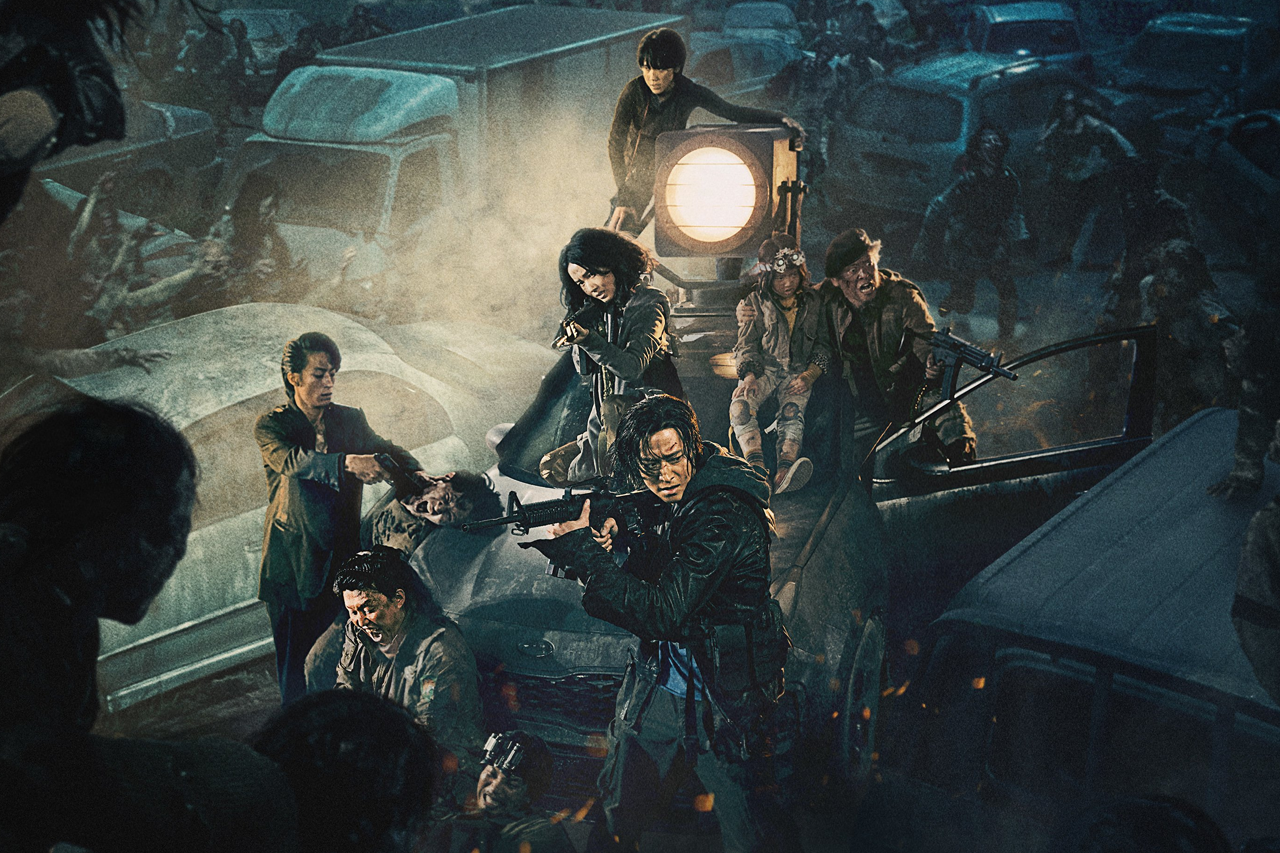Released only a couple of months ago, Peninsula promises to expand the world created in Train to Busan and, following it, has to face very high expectations for a movie that’s been almost four years in the making.
Plot
Right after the zombie epidemic, an ex-soldier (played by Gang Dong-won) and his team look for a valuable cargo that was left behind in the desolation that South Korea has become.
Review
I saw Train to Busan not that much later than its release and from the moment a sequel was announced, I started counting down to the new date expecting to see some of the characters that managed to survive at the end of Train to Busan again.
Unfortunately, that’s not what Peninsula does.
The protagonists are completely new and the movie presents itself as an opportunity to expand the world where South Korea fell victim to a zombie outbreak and to give us a wider future to the event of Train to Busan.
A bigger movie
Peninsula expands Train to Busan‘s world not only geographically, but also on a cinematic level.

© IMDb
It is immediately clear that the success of Train to Busan gave Peninsula the chance to benefit from a bigger budget and therefore to make everything else bigger too.
Distant are the days of the small train. Peninsula tells us right from the first few minutes that the outbreak in South Korea hasn’t been contained and that the rest of the world, after an initial willingness to help, decided to protect themselves and isolate the peninsula in favour of defending themselves against the infected people who might end up on the refugee ships full of people trying to escape.
And that is exactly the way in which the background of inequality and egoism is presented in Peninsula.
The South Korean citizens who managed to escape and save themselves have become social outcast left to poverty and solitude and the ones who are still trapped on the peninsula are nothing more than a footnote in the lives of the rest of the world who is happy to turn away from them.
The budget

© IMDb
Even though Peninsula gives us a glimpse of how the refugees are living outside of Korea, the story brings us straight back there when the protagonist Jung-seok volunteers to go get a valuable monetary cargo that was left behind on the peninsula in the hope that by bringing it with him, he’ll be able to make a new life that goes beyond that of being an alienated refugee who is still as infected outside of Korea.
The environments that we find in the Korea that has been devastated by the outbreak are a genuine gem of VFX that greatly surpasses the setting of the claustrophobic Train to Busan, and both the action and the horror of Peninsula seem more urgent than those of it predecessor.
All of this, however, at the detriment of novelty and emotionality.
The atmospheres
Train to Busan is an unusually bright horror movie for its genre. During the almost entirety of the story, you can perfectly see what is happening, the events are shot in broad daylight, going against another horror norm.
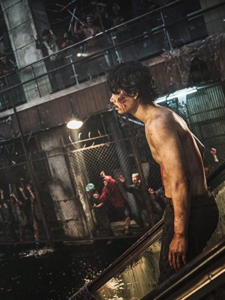
© IMDb
Instead, Peninsula goes back to a darker atmosphere that is in part necessary for representing a story that takes place in such a large setting and that allows for light to be used as a support to the action, but at the same time, it inevitably squashes its novelty.
The setting is less original and the claustrophobic feeling is replaced by a fear that derives from the inability of predicting where the threat will be coming from, both the zombie and human ones. Yes, in a devastated South Korea, the few who survived fight against each other to obtain the resources that are left.
The characters
Among the survivors, together with the protagonist who managed to escape to Hong Kong, we find a few more new faces than Train to Busan.
Some of these new characters we get to meet have certifiably booming entrances, the most impactful of which is that of the young Joon-i (played by Lee Re) who saves the protagonist with a riveting car chase and who, for the whole movie, shines for her abilities and familiarity she uses to navigate this universe where the big open spaces are much more of a curse than a blessing.
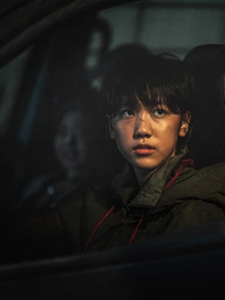
© IMDb
Despite these notable presences, contrary to Train to Busan, we have to make more of an effort to get attached to the characters.
The pressing predominance of the action scenes becomes destructive to the emotional construction of the characters and our ability to get invested. In Train to Busan, every single loss felt personal because that was the level to which the emotional weight of the movie could aspire, whereas in Peninsula, even though we wait and hope for the emotional scenes, they end up with an artificial characteristic that prevents them from appearing completely organic.
We get attached to the characters, even hope for the success of the good guys and the demines of the bad ones, but when that happens very little of the emotionality that we would like to feel remains.
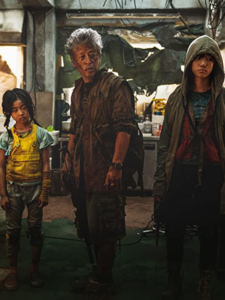
© IMDb
A breathtaking aesthetic
All in all, Peninsula is a solid movie and if I were to make a ranking, it would still manage to win over Seoul Station but would still find itself second after Train to Busan.
The budget of the movie ensures that it can benefit from an exceptional aesthetic in which color takes on a quality that steals our breath, and the environments with which the ruin of society is presented have a grandeur that significantly surpasses the small spaces of Train to Busan. The visual beauty mixes with the grittier parts of the story in an extraordinary balance that charges the story with emotion, albeit artificial ones, that manage to keep the entertainment value high all throughout.
Much more of an action movie than a horror one, Peninsula definitely shines in the first genre but doesn’t reach the level that Train to Busan got us used to in the second. There is also a kind of luck and unluck at the same time in the release of Peninsula in the midst of a pandemic that showed us that every country would indeed act exactly as Peninsula predicts they will: in an egotistical manner that very ofter ignores the vulnerability of the social groups that finds themselves at the margins of society.
A final assessment
Overarching themes
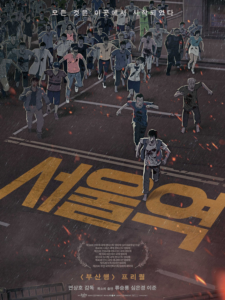
© IMDb
Seoul Station, Train to Busan and Peninsula share several themes even though they go about them in different ways. In all of them, the story and survival are driven forward by familial love and all three try to approach the subject of inequality in varying degrees.
But where Seoul Station tends to lose its emotional weight in favour of delving more into the social commentary and Peninsula ends up overdoing it because of its own sheer size, Train to Busan succeeds in touching the viewer because it attains the often unreachable position of managing much more than the other two movies to involve the audience emotionally through its character-driven stories.
All three movies are a huge example of success in the horror genre, but I personally believe that only Train to Busan truly manages to stand out in an environment that is nowadays saturated with more or less profitable movies of the same genre.
Female characters
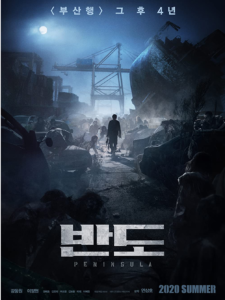
© IMDb
One thing that Peninsula does do better than both Seoul Station and Train to Busan is giving a wider space to its female characters.
In Seoul Station, Hye-Sun inevitably ends up coming across as irritating with her inaction and in Train to Busan, very little initiative is given to the women of the story who instead stand up thanks to the excellent performances of the actresses who play them.
Only in Peninsula the female characters are fully and actively autonomous and end up being loved because of the way they seem to have been conceived right from the start.
Final thoughts
There’s no doubt that Seoul Station, Train to Busan and Peninsula are movies that bring something very strong to the horror genre in ways that differ greatly between each other.
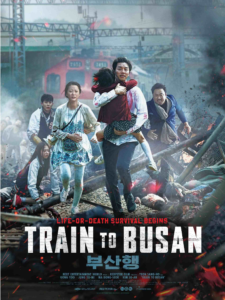
© IMDb
I think it’s pretty obvious from my reviews that I didn’t really like Seoul Station because, even though I found it quite solid and definitely well-done when it comes to the social commentary of the story, from a narrative viewpoint, I think it ends up being plainly and simply weak and visually unpleasant.
Peninsula is, as I already said, a movie that goes to great lengths when it comes to action but ultimately not all that unforgettable, and it doesn’t really make you want to watch it again if not to better experience its aesthetic side.
Train to Busan is, in my humble opinion, the best out of the three. As a huge fan of it, I was especially disappointed by the other two because I got used to the standard that Train to Busan had promised and I had waited with trepidation for the extension to a story that, once expanded, could have had a huge potential that wasn’t reflected in the sequel and it was surprising not to find in the prequel.

